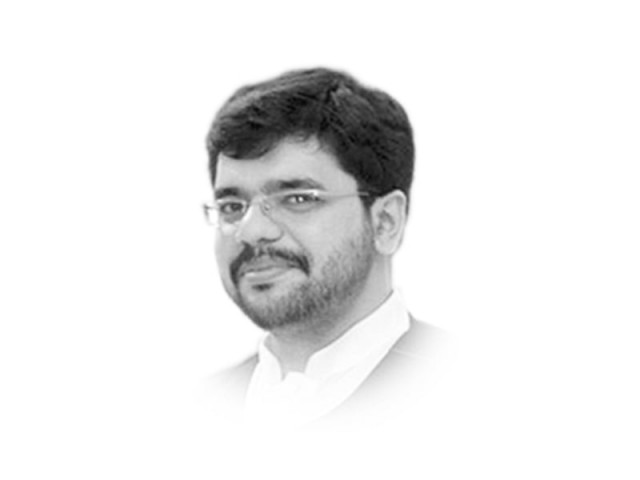Misconceptions about the Jamaat
The Jamaat is a national asset and every Pakistani is invited to understand and support it.

The writer is a graduate of the University of Management and Technology Lahore and grandson of the late Qazi Hussain Ahmad, who was the JI amir from 1987-2009. He Tweets @miqazi
The world has a superficial perspective of the Jamaat, the very party that inspired political forces in other Muslim countries to unite and compete within the paradigm of democracy to achieve power and defy the narrative of armed struggle that has caused severe damage to the message of Islam. However, stereotyping has tarnished the image of these men and women who contributed towards the social well-being of their fellow countrymen.
Turkish Prime Minister Recep Tayyip Erdogan, ruling Turkey under a secular constitution, who considered the late Qazi Hussain Ahmad as a mentor, expressed his concerns noting the fact that political movements were inspired in the early ’90s from the democratic activism of the Jamaat and blossomed into power after gaining popularity among the masses. Yet, the Jamaat could not bag much independently. The now imprisoned 80-year-old Mahdi Akef, former head of the Muslim Brotherhood, in his speech during a condolence reference for the late Qazi Hussain Ahmad said that it was the Jamaat that gave us the hope towards inception of a democratic dawn after years of repression that once again has been reigning over them since June 2013.
The face of the Jamaat is absolutely opposite to what it is perceived to be. The leadership of the Jamaat often receives criticism for having a soft corner for the ideology of the Taliban; however, this spontaneous reaction lacks research and is generally influenced by a distorted perception of statements.
In contrast to the allegations of being extremist, the fundamental values of morality, adherence to the democratic, legal and constitutional framework of Pakistan and service to humanity are ignored by the Jamaat’s critics. For them, the main factors of criticism on the radar is the role of Islami Jamiat Talaba, based at the University of Punjab, in supporting the Afghan struggle against the Soviets and the struggle in Kashmir against the Indian Occupation, duly chartered by the government of Pakistan. The Jamaat is fortunate that even its critics acknowledge the honesty of its leadership and workers and are thus not able to bring even a single case of moral and financial corruption to the fore. It is also pertinent to mention that majority of the Jamaat workers including its leadership, stem from the universities, which provides a diverse exposure to individuals.
A PPP government supported the Taliban against the proxies of Russia. In contrast to that, it is worth noting that the leadership of the Jamaat never travelled to Afghanistan and didn’t enjoy good terms with the Afghan Taliban at all. The relationship of the Jamaat with the Hizb-e-Islami in Afghanistan suffered an end after differences were stirred in a vested race to gain power.
Unfortunately, the Jamaat eventually faced the wrath of people several times in elections from those who feared a Taliban-brand of governance from its pavilion.
Most particularly, I have observed that women in Pakistan have a grave view of the Jamaat and see its leaders as hardliners who will snatch away their rights if elected to office. I always wonder how one could be judgmental without looking into the role of the women in the Jamaat. The women’s wing of the JI is the strongest vehicle towards its progression. It has exceeded in achieving milestones and making constructive contributions to the livelihood of women deprived of basic social amenities across Pakistan. Recently, the Jamaat, under the new the leadership of Sirajul Haq, took a firm decision in Dir to let women vote in the last elections.
With regard to minorities, the Jamaat has always said that they are part of our society and have all the liberties to practice their faith under the provisions of the constitution. The minority wing of the Jamaat is very active and includes Christians, Sikhs and Hindus who have always supported the righteous causes of the Jamaat without any reluctance.
Of late, there has been a positive shift in the mindset of youth towards the Jamaat. The social media has demolished the conventional barricades and now increased interaction between the party and the masses is cultivating a better understanding on common issues.
The Jamaat aspires to maintain good relations with both the West and the Muslim countries by playing a role in eliminating differences that is causing damage to the fabric of humanity. Rest assured, the Jamaat does not promote violence against any state in any form and determinedly believes in a peaceful struggle inside Pakistan.
The Jamaat is not a cult or personal property. It is a national asset and every Pakistani is invited to understand and support it under the guidance of Sirajul Haq for a better Pakistan.
Published in The Express Tribune, April 17th, 2014.
Like Opinion & Editorial on Facebook, follow @ETOpEd on Twitter to receive all updates on all our daily pieces.
















COMMENTS
Comments are moderated and generally will be posted if they are on-topic and not abusive.
For more information, please see our Comments FAQ